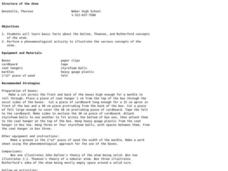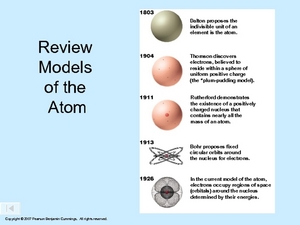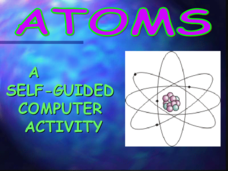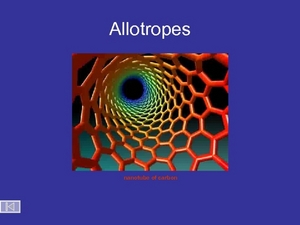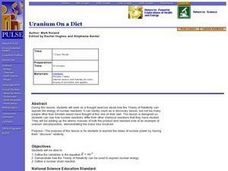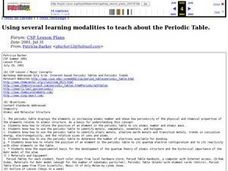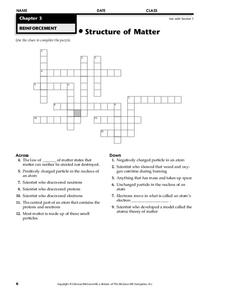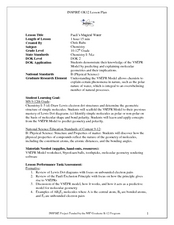Curated OER
Bonding Theories
In this bonding activity, students fill in 8 blanks with the appropriate terms about theories of bonding, they determine if 6 statements are true or false, they match 5 terms with their meanings and they solve 1 problem related to hybrid...
Curated OER
Atomic Theory, Structure, and Symbols
In this atomic theory worksheet, students review the observations that led to the conclusion of the atom having a positively charged nucleus. Students compare atomic number and mass number and explain how the discovery of subatomic...
Curated OER
Structure of the Atom
Students observe 3 models that show Dalton, Thomson and Rutherford's theories of the structure of the atom. In this structure of the atom lesson plan, students observe each model and write a summary of each theory of the atom.
Curated OER
Review Models of the Atom
Multiple representations of the varying theories of atomic structure. With these pictures and some background of the theories and scientific figures surrounding them, your class will develop a better understanding of scientific history...
Curated OER
Review Set
The topics covered in these multiple choice questions are about atomic structure and bonding, state configurations, pressure and solution concentration, and energy graphs. This is a midterm review which could be used with the whole...
Curated OER
Atoms : A Self Guided Computer Activity
"Self-guided Computer Activity" simply means that young chemists read through the slides and take notes about atoms along the way. There is an abundance of text on each slide, making this a comprehensive introduction to atomic structure....
Curated OER
Atom Review
In this atom activity, students review the subatomic particles, the scientists associated with the atomic theory, and the periodic table. This activity has 15 matching, 24 fill in the blank, and 11 short answer questions.
National Institute of Open Schooling
Chemical Bonding
Name is Bond, covalent bond. Through readings and answering questions, classes explore the different types of chemical bonds, their characteristics, valence shell electron pair repulsion theory, and atomic orbitals.
Curated OER
Organic Chemistry Problem Set Exam 1
Though there are technically only 13 questions on this exam, they take up six pages and make a thorough assessment of organic chemistry principles. There are plenty of diagrams to label or complete. Emission spectra are displayed for...
Curated OER
Allotropes
Brilliant graphics depict a variety of allotropes, especially the allotropes of carbon. Some notes are available to help make these useful for teaching your young chemists, but not for every slide. With some additional preparation on...
Curated OER
A Model of a Scanning Tunneling Microscope
Ninth graders explain how a scanning tunneling microscope works. In this chemistry instructional activity, 9th graders construct atomic models and simulate how their images appear under the STM. They discuss the limitations of their...
Curated OER
Matter and Energy
Students participate in a small group read aloud of the short story, "Cerium" by Primo Levi. They answer several questions about the story and then relate the reading to a lecture on Kinetic theory. After the lecture they apply the...
Curated OER
What are Atoms?
In this atom worksheet, students read about Dalton's contributions to the structure of the atom. They answer five questions about Dalton's ideas, the law of multiple proportions and the law of definite proportions.
Virginia Department of Education
Elements and Electron Configuration
It's electronic! Pupils uncover elements and their electron configurations as they explore mass, groupings, correct charges, and sliding theory. Young scientists learn creative ways to remember various elements and correctly...
Curated OER
Uranium On a Diet
Students examine how nuclear reactions differ from other chemical reactions they have studied. They add up atomic masses of both the product and reactant side of an example of uranium decomposition, demonstrating mass loss involved.
Curated OER
Modern Physics, QM
In this physics worksheet, students examine the theory of quantum mechanics through the answering of the nine questions. The answers are accessed through the links by each question.
Curated OER
Using several learning modalities to teach about the Periodic Table.
Students identify how to relate the position of an element in the periodic table to its atomic number and atomic mass. They identify how to use the periodic table to identify metals, semimetals, nonmetals, and halogens, and also,...
Curated OER
Structure of Matter
In this science puzzle worksheet, students solve a crossword puzzle related to matter. For example, "Scientist who discovered protons."
Curated OER
Robert Boyle and the Mechanical Philosophy
Young scholars read and discuss Boyle's Mechanical Philosophy and his rejection of Aristotle's theory of "Forms and Qualities." They answer a given set of questions and discuss these with the class.
Curated OER
Pauli's Magical Water
Students predict the shape of molecules using VSEPR theory. In this chemistry lesson, students differentiate a polar and nonpolar molecule. They discuss why water's polarity is very important.
Curated OER
Beat the Greeks
Students conduct research of the history of atomic theory. Information is presented from Democritus and Aristotle to the early Renaissance using the Internet and video.The integration of technology allows for a vast amount of research...
Virginia Department of Education
Molar Volume of a Gas
What is a chemist's favorite plant? Stoichiome Tree! Scholars produce hydrogen gas by reacting magnesium with hydrochloric acid. Then they calculate the molar volume of the gas produced before answering assessment questions.
Curated OER
Applied Science - Physics Pre-Lab
Students describe the science of physics. In this Physics lesson plan, students observe examples of physics within their classroom. Students create a definition for physics.
Curated OER
Beads, Balls, and Beakers
Students analyze the amount of space required to pack round objects. In this geometry lesson, students practice using space economically by practicing packing spheres into beakers. They then translate this concept to molecules being...


